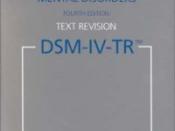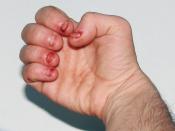Do you remember, when you were a child, checking under your bed before going to sleep just to make sure there were no monsters that could come out at night and harm you? Such ritual behaviour can become problematic with age if they start taking more and more place during one=s daily life. Then, one can suffer from obsessive-compulsive disorder (OCD). In order to understand this disorder better, we should explore its symptoms, its statistical information, its possible causes, and conclude with the possible treatments that can help one get rid of that neurosis.
A person who suffers from obsessive-compulsive disorder will experience obsessions that will differ from an individual to another. These obsessions are recurrent, persistent ideas or thoughts that involuntarily enter one=s consciousness (Diagnostic and Statistical Manual of Mental Disorders [DSM-III], 1980). As an attempt to ignore or suppress these obsessions, the individual will use repetitive behaviours called compulsions.
This repetitive, ritualistic behaviour aim to reduce the anxiety that is produced by the obsessions that person is experiencing (Storch, 2005). Although one performs compulsions in order to neutralize or reduce the anxiety produced by these obsessing thoughts, the relief is only temporary (Anxiety Disorders Association of America [ADAA], 2005). When performing these compulsions, one does not feel any pleasure and knows that this action is senseless because his/her need to perform that same action will come back over and over again (DSM-III, 1980). That is why a person who suffers from OCD can, for example, wash his/her hands a fifty times a day because he/she feels unclean. The most common obsessions-compulsions behaviours are related to contamination, to the need to organize and place things meticulously in a certain order, and to the assertion of violent thoughts. (Association / Troubles Anxieux du Québec [ATAQ], 2005).
Even though...



Opinions
I find it really very useful.
0 out of 0 people found this comment useful.